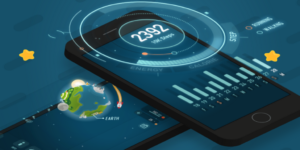Two significant issues Americans face today are weight and money related. Adult obesity rates now exceed 35% in five states, and more than one-third of Americans have obesity. The annual medical cost of obesity in the U.S. is approximately $147 billion. Yet, about 69% of Americans have less than $1,000 in savings, and 34% don’t even have a savings account.
Our sedentary lifestyles and preference for instant gratification over thoughtful planning for the future are contributing factors, and both are outgrowths of an always-on digital society where 77% of Americans own smartphones. The fact that we spend our days glued to our screens – with motionless, time-sucking games and easy impulse purchases just a click away – is slowly killing us and draining our bank accounts along the way, critics say.
However, not everyone sees mobile devices as a negative influence on society. An innovative mobile design studio called Fourdesire is using mobile gamification as a tool to help reverse the obesity epidemic and teach Americans to make smarter financial decisions.
Effecting Positive Life Changes Through Gamification
“Fourdesire is a studio that combines technology, design, and fun,” says Taco Chen, CEO of Fourdesire. “We use gamification to make boring, routine tasks interesting and help people improve their lives by giving them positive motivation to develop good habits.”
Gamification, the application of game elements to solve non-gaming problems and make learning interesting and fun, is not a new concept. Gamification has been used by many organizations for years for employee engagement, recruitment and training; marketers are using it to engage customers and retention; and the technology is a natural fit for eLearning. There’s even a game that encourages children to read. The global gamification market is projected to grow from USD $1.65 billion to USD $11.1 billion by 2020.
Presently, most gamification applications are used for commercial purposes. Fourdesire is using the technology not to train employees, teach students, or entice consumers to make purchases, but to encourage people to practice good financial and health habits.
Fourdesire’s Walkr app is a mobile “exergame,” a form of video game play that requires players to participate real-world exercise. Unlike pedometers and fitness gadgets, which only log steps or miles, Walkr combines users’ pedometers with a vividly vibrant galaxy-building game. With each step players take, they accumulate energy to fuel their spaceship, which they can fly around and explore over 25 planets, each with their own ecosystems and alien lifeforms, including lost space creatures who need help finding their way home. A leaderboard lets them play against friends, view their achievements, and read messages from the alien characters.
“Walkr is a great way to get people of all ages, from 9 to 99, moving more,” notes Chen. “The more they walk, the further they can progress in the game.”
Through the combination of financial tracking and city simulation comes the app Fortune City. In exchange for tracking their real-world expenses, players are rewarded with a growing city that is unique to them. Meanwhile, the app builds personalized charts to give players a clear understanding of their personal finances, and users earn achievement awards for good spending and saving habits.
“Players pick up good budgeting habits as they track their income and spending so that they can grow their personal fortune into a prosperous virtual city,” says Chen.
Another app offered by the company is Plant Nanny which encourages users to drink more water; if users drink enough water and track their intake, their virtual plant prospers. If they don’t drink enough water, it dehydrates and “dies,” and they have to start over.
Certainly, people don’t really need mobile apps to exercise, drink enough water, or make smarter financial decisions. They can manage to do all this on their own, right?
“Yes, they can, but people respond well to positive motivation and feedback, especially when it comes to boring things like exercise and finance,” Chen says. “Most of our users download our apps because of their design, graphics, and user interface. With Fortune City, users become hooked on tracking their finances so that they can watch their city develop. Walkr players can’t wait to get their steps in so they can grow their galaxy, and the Plant Nanny plants are really cute, so people don’t want them to wither and ‘die.’
“We’ve really just scratched the surface of what gamification can do for individuals. We think we’ll be able to help people overcome many real-life problems and have fun while they’re doing it.”








